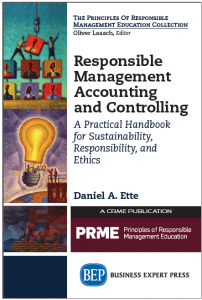Book ‘Responsible Management Accounting and Controlling’
Daniel Ette

The Book
Sustainability is becoming a business megatrend. The issue of this book is to be seen in the fact that controlling departments are hardly involved in sustainability topics and do not contribute to corporate responsibility. This book postulates the following assertion: responsible controlling is indispensable to make an organization more responsible. The objective of this book is the conceptual development of a responsible controlling framework toward decision making which is based on an ethical fundament in order to make a company a responsible business.
This book presents a thoroughly examined recommended course of action regarding responsible controlling for practitioners based on a profound theoretical background. We take a close look onto responsibility. In this context we find out that responsibility means recognizing the unimpeachable freedom of all human beings. Corporate responsibility deals with the legitimate claims of all stakeholders. Ethics as a basis for responsibility must not be understood as one ethical approach in the realms of consequentialism or nonconsequentialism. Rather a prism of ethical theories helps to better understand the issue at hand. Especially Kant’s categorical imperative, extended by a consequentialist view, is helpful.
I show what is to be understood by controlling in an organizational context and in which areas controllers are active. Moreover we will regard different controlling approaches toward sustainability. Yet, we realize that the prevalent controlling concepts are not sufficient with respect to responsibility.
Through the development of a responsible controlling framework I give recommendations how the status quo of controlling should be altered in terms of both tools and mindsets. In detail I elaborate a twelve-step responsible controlling roadmap which shows how controlling can contribute to foster a corporation’s responsible behavior and how sustainability topics can be integrated in management decisions. With regard to decisions, I expose that the basis for good decisions is to be seen in the recognition of all legitimate claims and thus in the unimpeachable human dignity of all human beings. I do not provide a catalogue with clear-cut answers or behavioral instructions. On the contrary, it becomes evident, that ethics as a critical reflection effort is central to responsible controlling. Decisions in a responsible sense will not be made on hard facts, like profit, as the sole criterion. Soft facts must also be considered.
Responsible controlling must first and foremost be understood as a mindset. If controllers change both their mindsets and their tools toward responsibility and if they encourage others to do so as well, they can push responsibility into the whole organization. Thus, I can claim as a conclusion:
Responsible controlling is an uncommon but indispensable approach for making an organization more responsible.
The book is structured as follows: At the beginning, the context and the relevance of the issue of responsible controlling has been detailed. The following chapters will be concerned with the theoretical foundations of (1) responsibility, sustainability, and ethics (RSE; Chapter 2); (2) management accounting and controlling (Chapter 3); and (3) controlling sustainability and responsibility (Chapter 4). Regarding responsibility, we will examine what is to be understood by responsibility in an organizational context. Furthermore, you will find a discussion on why your organization should assume responsibility, which responsibilities should be taken into account, and for whom an organization is responsible.
Chapters 5, 6, and 7 synthesize responsibility and controlling and set up responsible controlling. To do so, a responsible controlling framework and a roadmap have been developed. Within the roadmap, there are recommendations on how to establish controlling as a driver toward sustainability. Finally, Chapter 8 summarizes all the topics discussed previously.
How to Use It
This book may be valuable for you, if you are
- a student or a professor in a business school or an MBA and an executive MBA student and like to get introduced to tangible but uncommon thinking from a controlling perspective;
- a practitioner within the field of controlling and management accounting and you are assigned to install a controlling system which takes into account RSE;
- a practitioner within the field of CR or corporate sustainability and you need to get familiar with the topic of steering a corporation;
- a corporate executive and you would like to make your organization both successful and a pioneer in sustainability.
More
Daniel A. Ette is energy and climate protection manager in a German medium-sized company and consultant for sustainability controlling and sustainable corporate management. In the past years, he worked as CSR consultant in a European Union project for implementing corporate responsibility in small- and medium-sized enterprises. Before that Mr. Ette implemented a sustainability controlling system for an international company. In 2012, his efforts were honored when the company he worked for was rewarded for Mr. Ette’s innovations with the “green controlling” award of the Péter Horváth foundation—one of the leading controlling think tanks in Europe.
In addition, Mr. Ette is a lecturer at different universities. Among others, he teaches corporate responsibility at the university of Constance in Germany, and values in business at the Baden-Wuerttemberg Cooperative State University. Furthermore, he was part of the working group green controlling of the International Controllers Association which published a book on green controlling. Mr. Ette has a German diploma in business economics and a master of arts in Responsible Management. In order to contact him please use the following e-mail address: daniel.ette@responsible-controlling.com
—–
If you are an author interested in publishing in the PRME book collection, please click here for the ongoing call for contribution.
